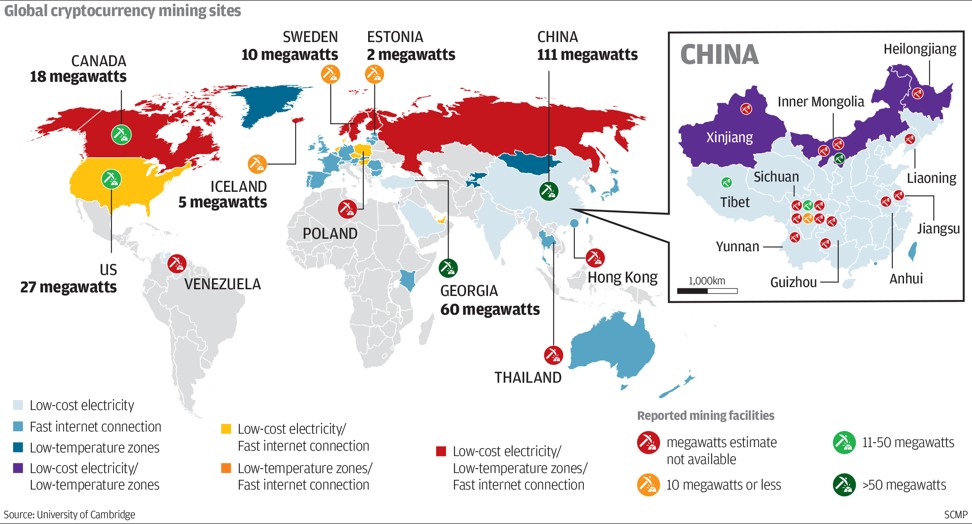Thailand, the Land of Smiles, is beaming on tourists, blockchain and cryptocurrencies alike to promote technological innovation
- Thailand’s National Innovation Agency is providing access to over 44 billion baht (US$1.4 billion/HK$11 billion) in funds
- Along with dedicated innovation hubs in Bangkok and Chiang Mai, the Thai government is aiming to nurture up to 3,000 start-ups within the next 10 years

As digital landscapes shift between the new and the old, blockchain and cryptocurrencies have quietly risen in popularity, particularly as countries experiment with emerging technologies.
With power increasingly framed by Asia’s soft ambitions as the region embarks on more persuasive methods of influence, the continent’s blockchain market is projected to grow by an estimated 87 per cent , with the next chapter of adoption likely to unfold within the East.
Even as Asia continues its advance, the industry has had to contend with an ambiguous legal environment, as countries within the region adopt varied stances on the regulatory spectrum.
Despite prohibiting the sale of cryptocurrencies through initial coin offerings (ICOs), China has remained friendly to blockchain, holding the largest number of blockchain patents in the world. In the Philippines, cryptocurrency has found a surer footing, with the country introducing a regulatory framework to bolster investor confidence.
The flurry of government activity and the topsy-turvy fortune of nascent technologies across the region point to an audience sure of blockchain’s future, but hesitant of the path ahead as the road forks.
Public sentiment continues to be key in shaping the direction of these emerging technologies, and countries that look to gain the first-mover’s advantage will have to be agile in navigating shifting goalposts and mobilising support.
As blockchain gains ground in Southeast Asia and countries vie to become the next cryptocurrency valley, Thailand has led the pack by hitting the marks from the get-go, and the Land of Smiles is beaming on tourists, cryptocurrency and blockchain alike.
Thailand’s evolution into a burgeoning blockchain hub is no accident. Since the roll-out of Thailand 4.0, digital transformation has played a prominent role in the country’s agenda. With every intention to break out from its existing economic mould, the government has set its sights on the creation of a new value-based economy, driven by the three pillars of innovation, technology, and creativity.
The bold 20-year strategic plan has made its first impact on the blockchain and cryptocurrency scene, with several friendly overtures: beginning with the legalisation of several notable cryptocurrencies for trading, followed by a green light on the issuance and trading of blockchain securities, and the latest announcement from the Securities and Exchange Commission (SEC) approving the country’s first ICO portal.
As projects across the blockchain and cryptocurrency space look towards global expansion, Thailand has placed itself on the map with its clear and welcoming guidelines.
While regulations often bring structure to the business landscape, their role in an emergent industry is especially pivotal. An eagerness to embrace disruptive technologies may be enticing to an ambitious emerging economy, but a measured approach in laying out a robust regulatory framework will ensure long term sustainability.
At the same time, digital transformation will hinge on more than just legislation, with support enabled by a number of key influencers.
Successful policies correlate directly to the work by change agents on the ground, and part of this is in celebrating a culture that rewards and actively supports innovation. Thailand’s National Innovation Agency is providing access to over 44 billion baht (US$1.4 billion) in funds, along with dedicated innovation hubs in Bangkok and Chiang Mai, aiming to introduce up to 3,000 start-ups within the next 10 years.
Countries that undergo digital transformation and look to move away from a dependency on long-standing, traditional industries will find that the journey is hardly a linear one. With frequent fits and starts, governments have to be rigorous in their engagement with uncertainty, displaying a healthy appetite for risk-taking, experimentation, and a willingness for trial and error.
Government agencies should not view untested technologies as a gambit or compromise, but instead, claim ownership of the directive process by implementing sound policy logic to clarify and soften the complexities of cutting-edge technology.
While blockchain and cryptocurrencies are still very much in their infancy, prone to much turbulence and change, their volatility allows countries to identify and leverage on opportunities at the intersection of technology, business, and society.
In a globalised world, the global stage is closing on itself, and countries are grappling with similar topics of disruption and change.
Rather than a forward-thinking approach championed by the government, it is the thoughtful consideration of the human element in the implementation of digital innovation which ultimately sets Thailand apart from other countries.
Nithinan Boonyawattanapisut is chief executive officer and co-founder of HotNow, a digital marketing company in Thailand that serves retail businesses
